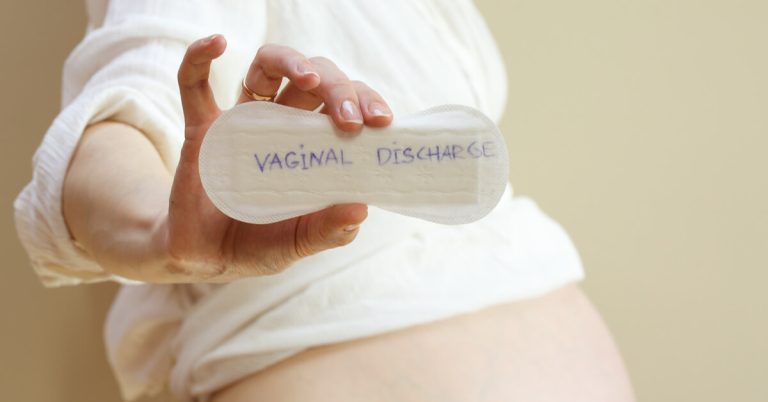From the moment you learn that you are pregnant, you could start to behave more sensitively and suspiciously on many issues. Now you not only think about your own health, but also about the health of your baby growing in your womb. For this reason, any vaginal bleeding or spotting becomes a subject that frightens expectant mothers and makes them very alarmed.
Implantation bleeding during pregnancy could be a sign of a serious situation like the risk of miscarriage. However, light bleeding, which is called spotting, is a common symptom among the first signs of pregnancy.
What is implantation bleeding? Why does it happen, and how long does it take? What are the features that distinguish it from other bleedings? Does it have any danger to the baby? We will cover all the questions in this article!
What Is Implantation Bleeding (Spotting)?
Reaching reproductive maturity, females release an egg cell (ovum) from their ovaries every 28 days in average. Oestrogen and progesterone hormones prepare the uterus during this period so that the fertilized egg could attach and live there.
If the egg cell does not meet with the sperm cell, fertilization does not occur. The layer surrounding the uterus is expelled from the body, in other words menstrual bleeding takes place. However, if the egg cell and sperm cell meet and fertilization occurs, the fertilized egg travels through the fallopian tubes to reach the uterus and attach to the inner wall of the uterus to develop. Light bleeding that occurs during this attachment is called blood bleeding or spotting.
What Causes Implantation Bleeding?
There is no condition that implantation bleeding should occur in every pregnancy. It occurs in approximately 25-30% of all pregnancies. In other words, implantation bleeding is likely to occur in one out of every 3 pregnancies.
For the embryo to continue its life after fertilization, it must hold on to the endometrium called the intrauterine wall. During this attachment process, the embryo causes the capillaries to crack due to some movements as it settles on the uterine wall. These movements cause of bursting of capillaries in the intrauterine wall and light bleeding. However, this bleeding in the early stage of pregnancy may have other causes such as the following, and expectant mothers may confused this bleeding with implantation bleeding.
- Sign of miscarriage
- Ectopic pregnancy symptom
- Presence of a cyst or tumour in the uterus
- Vaginal infections

What Are the Symptoms of Implantation Bleeding?
There are some signs that can help to understand implantation bleeding in pregnancy. Many of these symptoms are like premenstrual symptoms. However, the symptoms of implantation bleeding are much milder.
- Breast tenderness
- Gastrointestinal disorders such as constipation, diarrheal
- Tiredness
- Cramps in the abdomen
- Headache
- Nausea
- Frequent urination
- Loss of appetite
- Increase in body temperature
- Sudden changes in mood
How Does Implantation Bleeding Happen?
This bleeding has some peculiar features.
- Very Light or Very Dark Colour
Implantation bleeding is dark brown or very light pink in colour. When the capillaries in the endometrium are cracked, some blood that is released can also turn into a dark colour by clotting until it reaches the vagina.
- Little
The amount of implantation bleeding is very small and occurs in such a small amount that it cannot fill the vaginal pad. Sometimes it can occur in the form of a few drops of blood, sometimes in the form of vaguely light-coloured spots.
- Short Time
Implantation bleeding is short-lived. Spotting may last several days or hours. It does not last as long as menstrual bleeding just because the capillaries are deformed.
- Low-Intensity
Menstrual bleeding is usually brightly coloured and has a clotted consistency. However, spotting formed because of implantation are clot-free.
How to Distinguish Between Implantation Bleeding and Menstrual Bleeding?
Sometimes, menstrual periods may be confused with implantation bleeding. Expectant mothers who are unaware that they are pregnant may be mistaken in thinking that they menstruate due to spotting and for this reason, pregnancy can be detected late.
Differences below will help you to distinguish between implantation and menstruation.
- Menstrual bleeding takes 5-7 days on average. On the other hand, the implantation bleeding ends in a few hours and sometimes in a few days.
- Menstrual occurs every 28 days but implantation bleeding occurs a few days before the menstrual period.
- Menstrual bleedingis dense, coagulated and brightly coloured but implantation bleeding is low intensity, small amount, and very light or very dark in colour.
- During the menstrual period, intense cramps may occur in the groin, while very light and vague contractions occur in the implantation bleeding.
- There is an increase in hCG hormone in implantation bleeding.
If you would like to check our article “All About Beta Hcg Values!” click the link below.
https://www.bebek.com/en/hcg-levels-during-pregnancy
When Does Implantation Bleeding Occur?
Implantation bleeding, one of the first signs of pregnancy, is a harbinger of fertilization. Therefore, it brings the question to mind: “When does implantation bleeding occur?”
It occurs approximately one week after ovulation on average 6-12 days, shortly after the sperm fertilizes the egg cell. This period corresponds to a few days before your menstrual cycle. In other words, if your maturing egg cell encounters a sperm and is fertilized at this time, it starts the implantation process by reaching the uterus through the tubes at the end of a journey lasting between 6-12 days. Thus, a spotting occurs a few days before your normal menstrual cycle.
When implantation occurs also gives you information about how long pregnant you are. The date the spots appear is a sign that you are about one week pregnant, and this is about a week before spotting. A test to be done after 3 days can give you a definite answer about pregnancy.
How Long Does Implantation Bleeding Last?
When it comes to menstruation during pregnancy, the thought of bleeding as much as a normal menstrual period may come to mind. However, menstrual and implantation bleeding times differ. Implantation bleeding is not a very long and intense bleeding, as it is caused by the rupture of some of the capillaries during the attachment of the embryo to the uterus.
It is experienced mostly 1-2 days light spotting or stream. However, if there is a longer and more intense bleeding, you should consult a doctor as it may be a sign of an important condition.
Does Implantation Bleeding Have Any Disadvantage?
When you experience the implantation bleeding at the very beginning of the pregnancy, you may be worried about your baby or a serious condition. Additionally, it may not occur in every pregnant woman, but if it does, this is a very normal and usual process. It shows that the embryo is attached to the uterus. There is no disadvantage of implantation bleeding for you and your baby. However, it should be well differentiated from other vaginal bleeding. If there is a suspicious bleeding, you should visit your doctor.
Would you like to share your experiences and questions as a comment?
Have a nice and healthy day!







